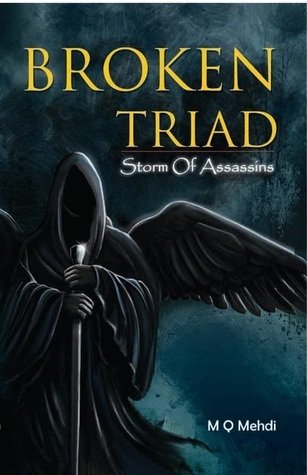Published in 2013, Broken Triad – Storm of Assassins by Mohammed Qasim Mehdi is the latest epic fantasy/sci-fi crossover genre novel in contemporary English. It is probably the first such English novel from Pakistan that was written while the author was an undergraduate student at Lahore University of Management Sciences.
I have seen this before
The story has a deja vu quality to it. Katash, an elite assassin from the Guardian cadres of Senate and the People’s Republic, leads a team to kill a traitor and a group of powerful people of Autariates of Necroxium. Realizing that a certain secret has been spread, the team splits up to kill as many enemies they can before returning to their nation. On return journey Katash meets a boy Aeli, apprentice of a sage looking for his purpose in the world, and saves him from bandits. He takes him under his tutorship and goes to Grand Bazaar where Aeli makes a new friend Guli, bonds with a rare Shaheen Aeris and survives a mixup with the notorious Assassin of Assassins.
At the city of Alcadia Aeli begins to live with Katash and his mother and initiates training under Katash for admission to the elite Guardian College of Alcadia. The plot reveals the functioning of Aura, the demonic hordes of Autariates and Elves of Elforcium that play major role in plot after halfway through the story. The story is relatively simple, mostly from Aeli and Katash’s point of view, and several people and races (Elves, Dwarves, Torians etc) come into contact with Aeli once he reaches Grand Bazaar and then Alcadia.
The elements of the this plot are familiar. The way the story progresses, one can identify certain features that may have been inspired from existing fiction work such as Star Wars, Naruto, Eragon, Shaman King etc. The plot is a collection of inspiring incidents of famous works adapted for a single storyline. While interesting, the story itself is not very original even if it has some refreshing qualities.
Chunin Exams
Readers familiar with Naruto universe will either take a strong liking or strong disliking of Broken Triad. The combat system is highly similar to the Ninja fighting in Naruto, including summoning and forbidden arts, and evolution of wisps has similarities with both Pokemon and Flame of Recca. The entrance exam for Guardian College of Alcadia, patterned the same way as the famous Chunin Exams of Naruto, may as well been re-living of the Naruto’s exams rather than of Broken Triad.
The first fight of Aeli and Guli with two girls is similar to Beyblade’s competitions (Tyson and partners) as well as Shaman King (Asakura Yoh) who win their initial fights with ease. The subsequent fights that gets harder has strong resemblance to how the events of Chunin Exams last round progressed (El playing a role similar to Neji, Kung being a mixture of Gaara and Rock Lee etc) and evolution Aeli’s wisp is similar to Kurei’s flame evolution when it absorbs soul of Kurenai in Flame of Recca. The betrayal, the nations at war towards the end of exams and grand finish (Aeli against the demon Belial while Naruto against Gaara) are extremely similar.
Page 91
Katash began his lesson, “There are five levels of celestials. They are wisps, djinns, spirits, titans and phantoms. Wisps are pure energy, as they gain experience, they evolve into djinns. Other than wisps all the rest have unique shapes. Like Pyra is a spirit and takes the shape of a burning wolf. Celestials cannot be killed; when they are seriously wounded, they dissipate from real space (our universe) back into the phase space (A region were they come from) to heal themselves.”
The above dialogue shows inspiration from video games (of evolution by gaining experience) and returning of celestials to heal (Pokemon and Codex Alera).
Places are named in cliched way … Plaguis in Land of Plague, Skyris, Cholixian Desert … they are either twisted forms of existing names or conveniently named based on what the place is going through. Elves are inspired from Lord of the Rings movies and shown as quite condescending, dwarves as dwarves are in most fantasy novels (merchants and miners) and there is a hint of role playing games to the way events move (particularly Elder Scrolls V: Skyrim).
Katash is Sensei to Aeli, Assassin of Assassins is Tutor to his pupils and such are the actual namings of student-teacher relations in the novel. There is high penetration of electronic and futuristic weaponry (with no indication of how electricity is generated to run the electronic items) and fighting, while a crossover of Naruto and Shaman King, has elements of third person video game Devil May Cry 3 where fighters use swords as well as guns during combat. Some elements are yet to be explained, for example why would they still use “tube lights” as light source when they have futuristic weaponry like Plasma cannons and sophisticated robotics that merge with human neural system?
The historical background and political structures are detailed and covered thoroughly, though much of it feels unoriginal because of so much borrowing of elements from works and adjusting it within the story line.
A Journey of Discovery
The novel strongly focused on the journey to self discovery, even if that road is not so well planned out. Curiosity provides the trigger to most adventures, good or bad, that Aeli and Guli go through. Curiosity got both Aeli and Guli in trouble regarding the mysterious package, it nearly got them in trouble for eavesdropping on secret meeting and it brought them close to death a few times. This also sheds light on their growing friendship that begins in Grand Bazaar and sees them through the biggest fight of their lives.
Family and relations are another explored dimension where Katash’s mother is practically a Pakistani mother … lamenting the fact that Katash is 31 years old and unmarried, meaning she is still longing for the day when she will become a grandmother (and thus takes a liking to Aeli as a grandchild). Guli and El’s remembrance of their fallen family members (another similarity to Naruto universe), showing the side of military families in a society dominated by elite forces.
Immature
The characters are mostly bland, lacking distinctiveness and personalities. Of all the people that readers come across in the story, two stand out … the dwarf selling eagles and monkeys in Grand Bazaar and El, the granddaughter of head of Guardian order. They are both unique, have certain behavior that remained consistent, the dialogues correlate with their personalities and realistic approaches to the situation they find themselves into.
Aeli, despite being former apprentice of a sage, apparently shows no signs of any sage influence. Katash has been made a combination of Kakashi and Jiraiya (Naruto’s teachers), and a failed one at that. He neither shows any signs of being senior and most trusted guardian, he is immature as a teenager and clearly lacks foresight that people have after crossing the dreaded mark of 30 years.
Similarly many other characters show immature behavior and are constantly annoying. For example, during the raid at the start of the story when some people run away, one guardian asks:
“Some of them ran away Katash. What should we do?”
Seriously? Members of elite Guardian order and they don’t know what to do when some targets ran away? The scene certainly shows a group of fighters who are good at fighting but have no idea about planning and objectives … a far cry from what elite groups really are (and they don’t joke around or taunt “Ow. I am so scared” either while attacking a room full of enemies).
The Less Said, The Better
Dialogues and language are quite disappointing. There is a lot more “Telling” than “Showing”, leading to rather badly scripted monologues and explanations that one would rather skip than suffer through. The starting monologue of Lord of Plagia about the return of their master and destruction of their enemies is bad enough that die hard fantasy readers would smack their heads and dread how worse it would get.
The book is littered with grammatical errors and spelling mistakes, showing a lack of proper editorial work.
Conclusion
Broken Triad: Storm of Assassins is a refreshing initiation of cross-genre literature in Pakistan despite being a disappointing first book. Even though it is made up of mostly borrowed concepts, that doesn’t mean it lacks creativity. The story has some attraction and better character build up will surely take it to a whole new level. The journey is something similar to what “Eragon” went through and there is a clear indication that with some mentor-ship and training, the story can become 1000 times better than what it currently is. A re-write of this novel under professional guidance can even make it a globally accepted literature, if the author wishes to take that route.


